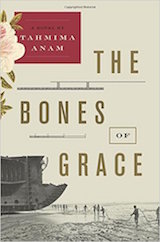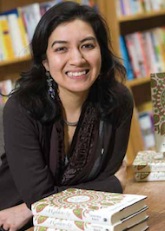The Bones of Grace
Tahmima Anam
|
The Bones of Grace marks the end of a loose trilogy that Tahmima Anam began with A Golden Age (2007). That book distinguished her as a young novelist writing resonantly about the ruptures of war. Her research into the Bangladeshi liberation war of 1971 and its emotional aftershocks included testimonies from her own freedom-fighter parents. These accounts were woven into her second novel, A Good Muslim (2011), with as much power and lyricism.
This third novel does not revisit the 1970s but plays with a polyphony of pasts, from prehistoric to the present. The parents’ story of war and liberation is there, but as a back-note. The foreground is now contemporary, the generation Anam’s own, and The Bones of Grace has at its heart not war but the shattering effects of conflicted love. The narrator, Zubaida Haque, is a young Bangladeshi palaeontologist and Harvard graduate, caught between countries, cultures and two men: Rashid, the Bangladeshi childhood sweetheart she has agreed to marry, and Elijah, the American drifter who sparks a mutual passion the instant they meet in a Massachusetts concert hall. Zubaida’s dilemma in choosing between Rashid and Elijah is the central motor for the plot of The Bones of Grace — whether to give in to an epic, all-consuming passion or cleave to marital security. Alongside the love story is Zubaida’s journey to find her roots — she is the adopted daughter of former freedom fighters but her real parentage, and her ancestry, is an agonising blank. There is also a fossil-hunt in Balochistan, where she is a lone woman among men, digging up the skeleton remains of a “walking whale” — an evolutionary anomaly named Diana. This hunt is aborted but another hulking leviathan makes its way into the story, this time a beached ship, “Grace”, which is being painstakingly dismantled by labourers as Zubaida oversees their work. Through these two decrepit totems from the past, combined with Zubaida’s attempt to discover her origins, Anam comes at history — big and small — from several directions, but these jostling elements create a sprawling, scattered effect, however adept Anam is at bringing them to a final, tidy close. The love story at its centre is not entirely convincing, either. The opening pages set out a first encounter between Zubaida and Elijah, who meet at a Shostakovich concert. “At your touch, I felt calmed at first, and then, when the music ended and you lifted your hand away, I experienced a piercing loneliness, the loneliness of being the sole inhabitant of my body.” This potent moment sets the tone of their affair, and the romance shapes the narration — the book is in fact a letter written from Zubaida to Elijah from beginning to end. As a piece of storytelling, the address to Elijah in the second person has its seductions. Her words are intimate, confessional, alluring. Anam hints at but withholds the rupture that is to come; she unravels the story teasingly, aware of the power of her pacing: “Don’t blame me for parsing out the story slowly, Elijah. These things take time … ” It works to lure the reader in, yet ultimately their love resembles an amped-up, idealised passion found only in fiction or in love letters. Perhaps this is the point — Zubaida’s letter is an act of creative persuasion, designed to win Elijah over. But even so, their connection seems random, and Elijah appears distant, unknowable, with a hint of the Orientalist lover (his last girlfriend was also from the subcontinent). More believable is the messy compromise of domestic love between Zubaida and Rashid — the comfort of familiarity, the memory of passion, the passive-aggressive charges following betrayal and, most of all, the rationale of make-do that has led to marriage. If Zubaida’s choice between love and duty is reminiscent of Anna Karenina, Anam signposts her debt to Tolstoy heavy-handedly — Zubaida owns at least three copies of the book; Elijah pulls one out of his shoulder-bag as he arrives in Dhaka, and Anna’s words to Vronsky are quoted. While Zubaida’s predicament resembles Anna’s, Rashid is not a convincing Karenin and Elijah is no Vronsky. The novel comes most alive as a domestic story, raising questions around family and belonging. Dhaka’s privileged class is gently satirised though Rashid’s internationalist family — his brother at boarding school in Singapore, his sister in New York, his hard-edged mother, who bears all the bigotry of the rich. Fractures in identity, explored though Zubaida’s orphan story, are another powerful element — the cultural shame she is made to feel over her unknown lineage in Bangladeshi high society and, further afield, the sense she is “amphibian”, forever negotiating in-between, migrant spaces. The Bangladesh independence war casts a long shadow over the present, even if it is pushed to the back of the story. It is a perpetually open wound that, decades on, can still reduce Zubaida’s adoptive parents to tears with sudden flashbacks, so that she comes to resent the inherited legacy of their trauma. In the end, it is these parts, around and outside the love story, that earn this novel its strengths. Arifa Akbar | 20 May 2016 | Financial Times
|


